2024年通用版小学英语小升初复 -一般过去时课件(共29张PPT)
文档属性
| 名称 | 2024年通用版小学英语小升初复 -一般过去时课件(共29张PPT) | 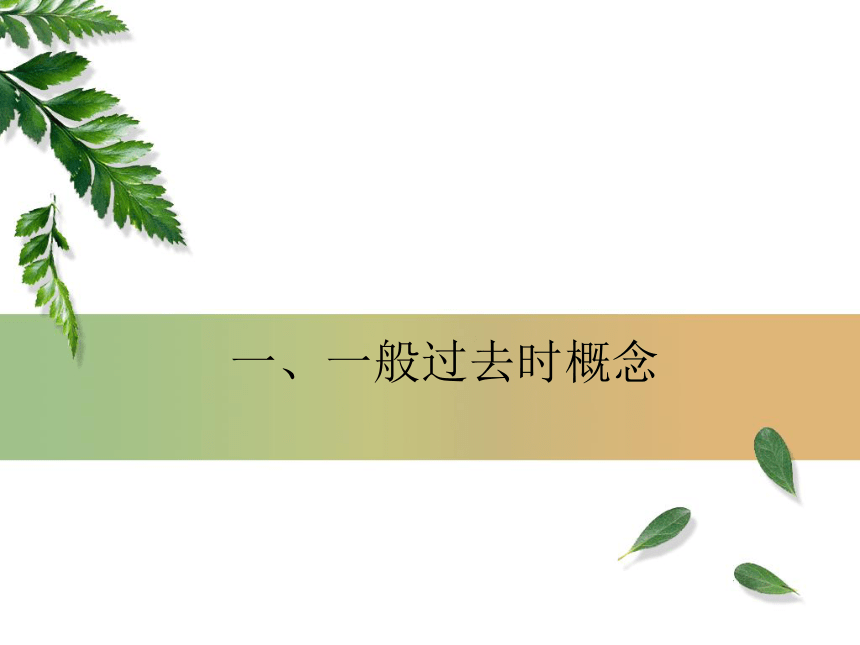 | |
| 格式 | pptx | ||
| 文件大小 | 648.9KB | ||
| 资源类型 | 教案 | ||
| 版本资源 | 通用版 | ||
| 科目 | 英语 | ||
| 更新时间 | 2024-02-22 11:46:54 | ||
图片预览

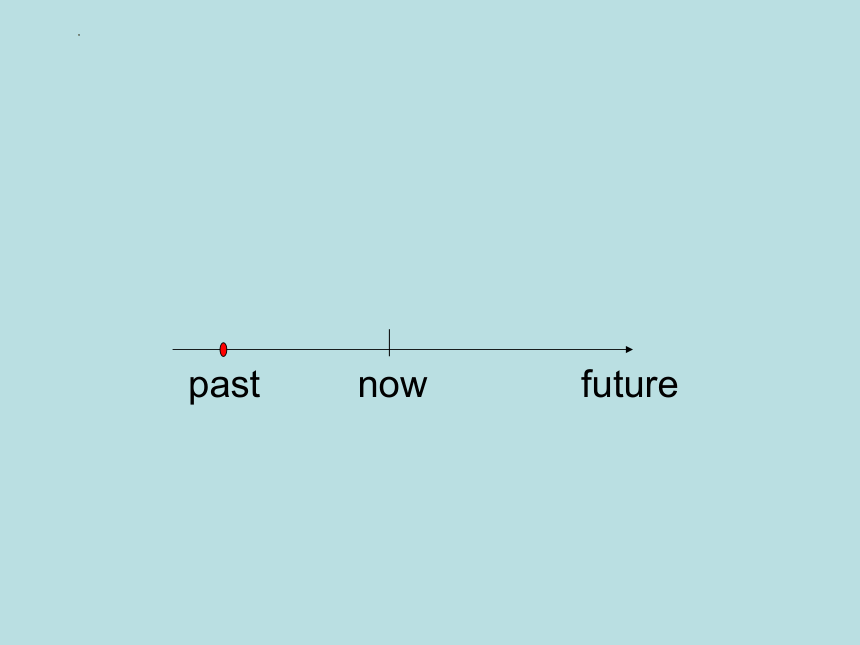
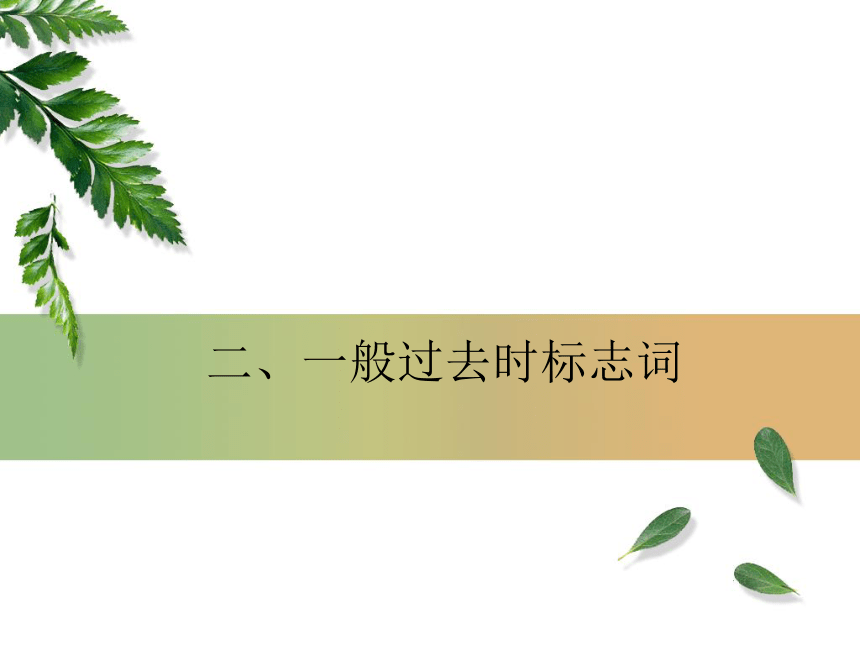
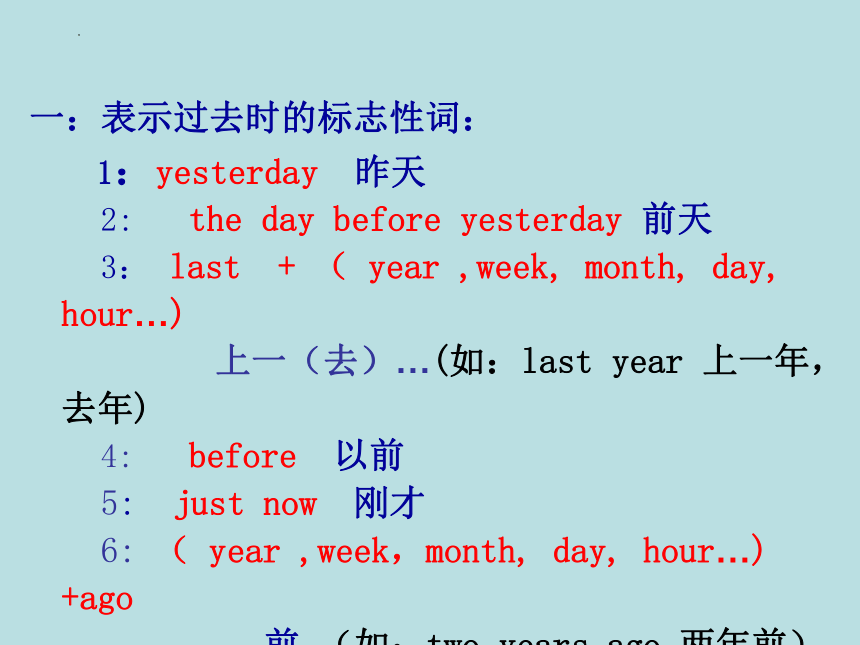
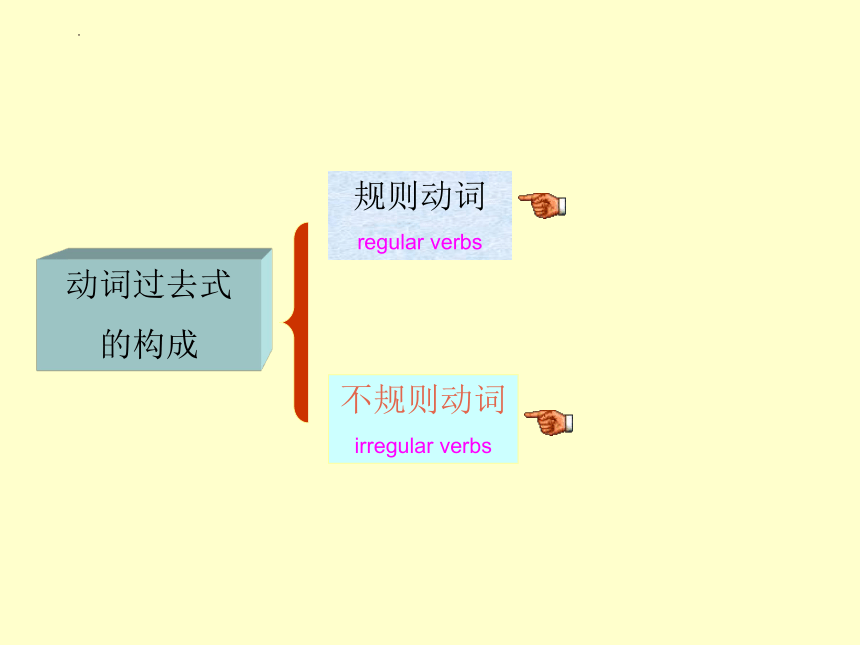
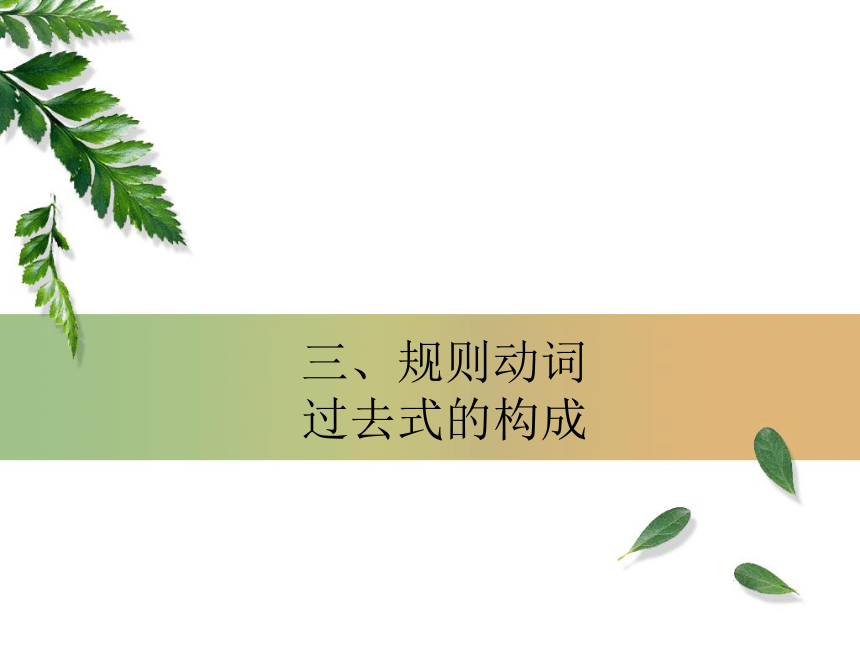
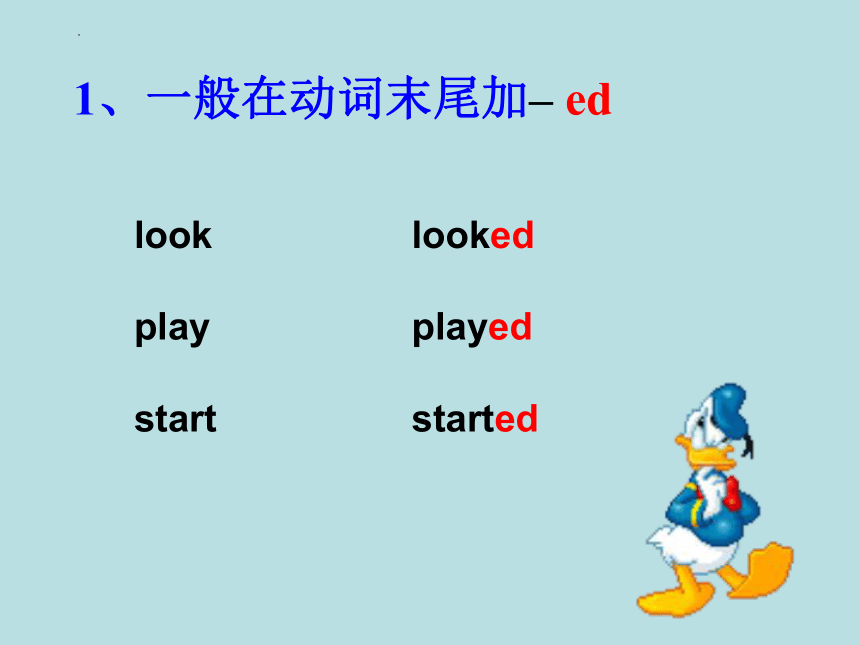
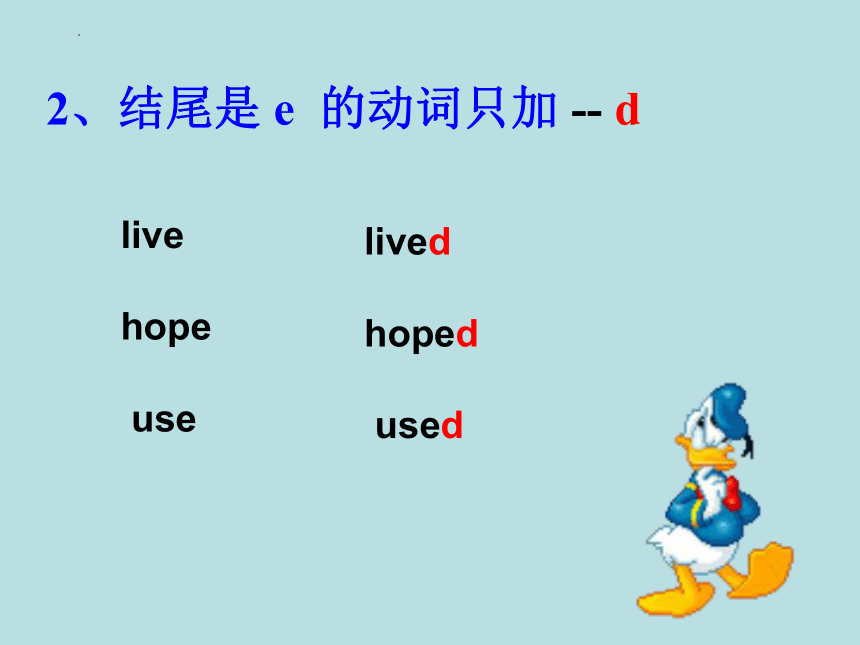
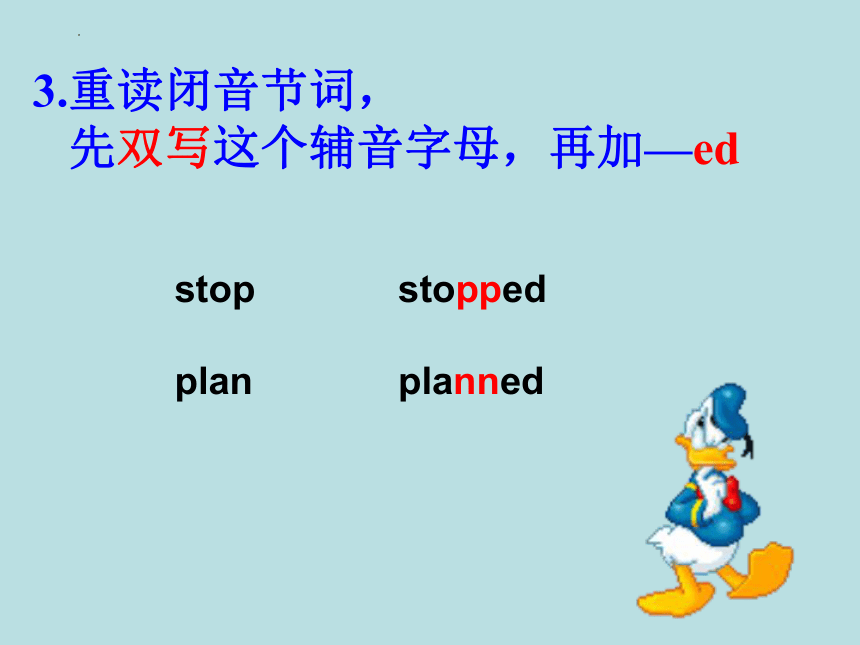
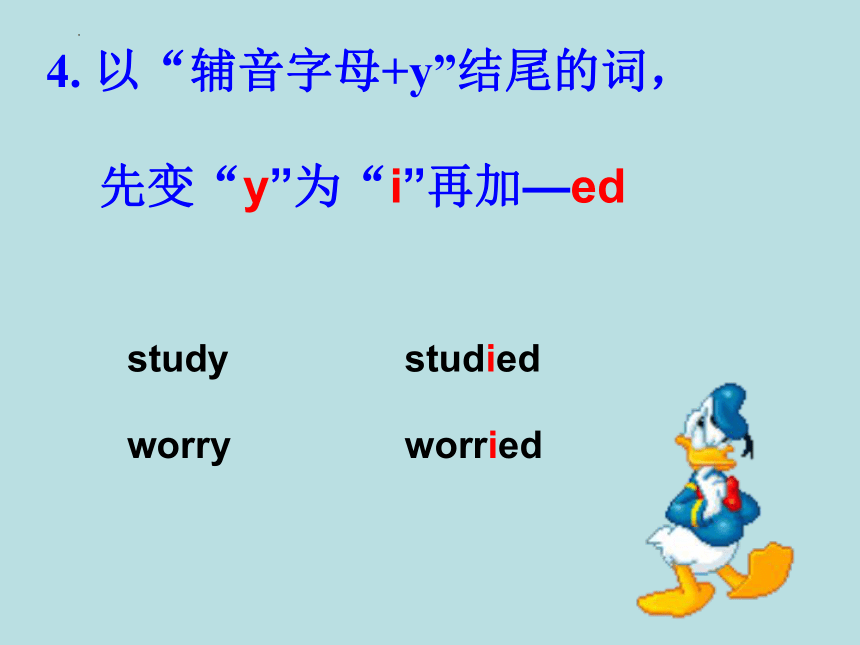
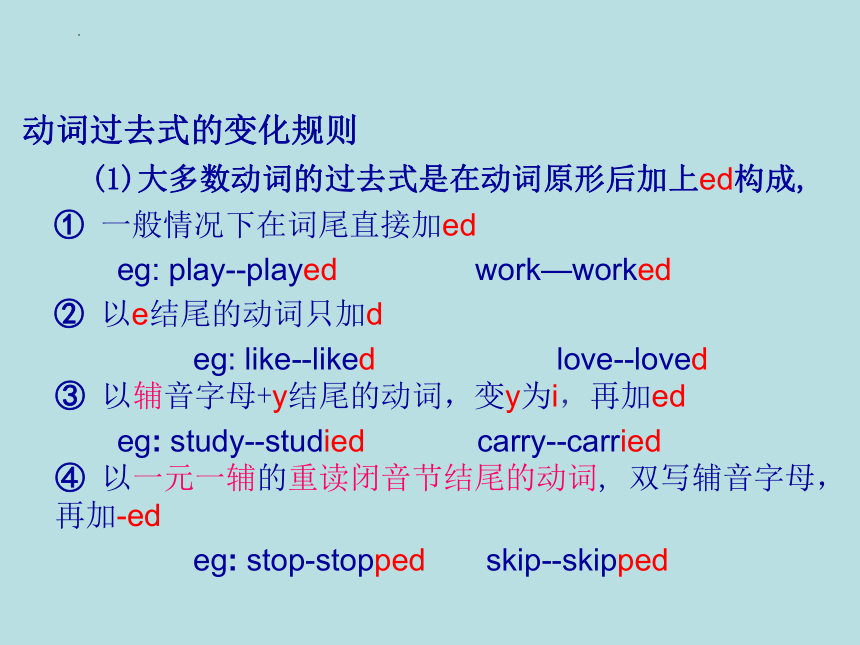
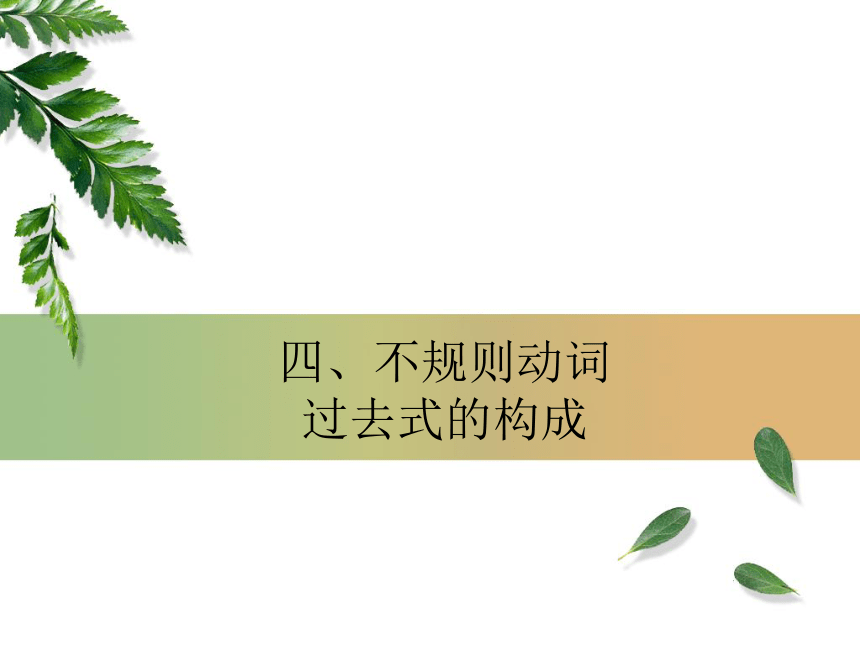
文档简介
(共36张PPT)
一、一般过去时概念
past
now
future
二、一般过去时标志词
一:表示过去时的标志性词:
1:yesterday 昨天
2: the day before yesterday 前天
3: last + ( year ,week, month, day, hour…)
上一(去)…(如:last year 上一年,去年)
4: before 以前
5: just now 刚才
6: ( year ,week,month, day, hour…) +ago
…前 (如:two years ago 两年前)
7: in +过去的一个时间(如: in 1998…)
动词过去式
的构成
规则动词
regular verbs
不规则动词
irregular verbs
三、规则动词
过去式的构成
1、一般在动词末尾加– ed
look
play
start
looked
played
started
2、结尾是 e 的动词只加 -- d
live
hope
use
lived
hoped
used
3.重读闭音节词,
先双写这个辅音字母,再加—ed
stop
plan
stopped
planned
4. 以“辅音字母+y”结尾的词,
先变“y”为“i”再加—ed
study
worry
studied
worried
动词过去式的变化规则
(1)大多数动词的过去式是在动词原形后加上ed构成,
① 一般情况下在词尾直接加ed
eg: play--played work—worked
② 以e结尾的动词只加d
eg: like--liked love--loved
③ 以辅音字母+y结尾的动词,变y为i,再加ed
eg: study--studied carry--carried
④ 以一元一辅的重读闭音节结尾的动词, 双写辅音字母, 再加-ed
eg: stop-stopped skip--skipped
四、不规则动词
过去式的构成
1.过去式与原形一样
let→let(让)
put→put (放下)
cut → cut(砍,剪)
read→read(读)
let→let(让)
put→put (放下)
2.把元音字母变成“a”
come came
give gave
drink drank
begin began
3.中间去“e” 末尾加“t”
sleep slept
keep kept
feel felt
4.把“i”变成“o”
ride rode
drive drove
5.结尾变成“ought”或“aught”
think thought
buy bought
bring brought
catch caught
6.“ow”或“aw”变成“”ew
know knew
throw threw
draw drew
7.结尾”d”变“t”
build built
spend built
am, is
are
do
go
have
make
get
eat
say
stand
find
begin
bring
look
play
feel
build
fight
give
teach
sing
buy
cut
come
draw
drink
drive
hope
use
start
was
were
did
went
had
made
got
ate
said
stood
found
began
brought
looked
played
felt
built
fought
gave
taught
sang
bought
cut
came
drew
drank
drove
hoped
used
started
剩余不规则动词表
grow
put
read
run
sweep
sit
sleep
spend
catch
swim
write
live
stop
plan
study
carry
grew
put
read
ran
swept
sat
slept
spent
caught
swam
wrote
lived
stopped
planned
studied
carried
五、一般过去时
肯定句变否定句
1)He was at home last night.
2)My parents were in the park just now.
3)They enjoyed the fashion show last Friday.
4)He went to the toy store yesterday. 他昨天去玩具店了。
1.肯定陈述句
主语 + 动词的过去式 + 其它
1. (be动词类)在表示过去存在的状态
的句子中在was, were的后面加上not。
如:
肯定句:
He was in the park the day before yesterday.
否定句:
→He was not in the park the day before yesterday.
肯定句:
We were busy last week.
否定句:
→We were not busy last week.
did didn't(无be借助)
2.(行为动词类)要在行为动词的前面加助动词didn’t. 然后把动词过去式改为动词原形。
即:didn’t + 动词原形
肯定句:
She played the violin last night.
否定句:
→She didn’t play the violin last night.
肯定句:
They swam in the lake yesterday.
否定句:
→They didn’t swim in the lake yesterday.
一般过去时否定句练习
肯定句: They made a kite a week ago.
否定句:They didn’t make a kite a week ago.
肯定句: He was ill yesterday.
否定句:He was not ill yesterday.
肯定句:The cat ate a bird last night.
否定句:The cat didn’t eat a bird last night.
六、一般过去时的
一般疑问句
1.把was, were放在句首,其余位置不变。
(1) He was born in Shanghai.
→ Was he born in Shanghai (一般疑问句)
→Yes, he was. (肯定回答)
→No, he wasn’t. (否定回答)
(2)They were in Li Yan’s home last night.
→ Were they in Li Yan’s home last night
(一般疑问句)
→Yes, they were. (肯定回答)
→No, they weren’t. (否定回答)
一般过去时一般疑问句及其肯否定回答
练习题
They had a good time in the park.
一般疑问句:
Did they have a good time in the park
肯定/否定回答:
Yes, they did.
No , they didn’t.
2. Ann did her homework yesterday evening.
一般疑问句:
Did Ann do her homework yesterday evening
肯定/否定回答:
Yes, she did.
No, she didn’t.
3. I read an English book last week.
一般疑问句:
Did you read an English book last week
肯定/否定回答:
Yes, I did.
No, I didn’t.
4. My brother was in the park just now.
一般疑问句:
Was your brother in the park just now
肯定/否定回答:
Yes, he was.
No, he wasn’t.
Her father _______ (read) a newspaper last night.
We _________(go) to the zoo yesterday.
______ you _______ (visit) your relatives last Spring Festival
______ he _______ (fly) a kite on Sunday
Yes, he ______.
It ______ (be) Ben’s birthday last Friday.
We all ______ (have) a good time last night.
He _________ (live) in Wuxi two years ago.
The cat ________ (eat) a bird last night.
read
went
Did
visit
was
had
lived
ate
Did
fly
did
Filling the blanks with the right form of the verb.
They ______ (come ) to China last month.
Mary _____ (read) English yesterday morning.
There _____ ( be ) no one here a moment ago.
I ______ ( call )Mike this morning.
Tom ______ ( begin ) to learn English last year.
My mother ________ ( not do ) housework yesterday .
There ____ ( be ) a telephone call for you just now.
came
read
was
called
began
didn’t do
was
_____ ( be ) it cold in your city yesterday
Was
1.
2.
3.
4.
5.
6.
7.
8.
1. The children had a good time in the park.(改为否定句)
2. Last week I read an English book.(对划线部分提问)
3. My brother was at home just now.(改为一般疑问句)
4. She had some bread for lunch today.(对划线部分提问)
5. They read English last night.(改为否定句)
6. Ann did her homework yesterday evening.(改为一般疑问句)
The children didn’t have a good time in the park.
When did you read an English book
Was your brother at home just now
What did she have for lunch today
They didn’t read English last night .
Did Ann do her homework yesterday evening
一、一般过去时概念
past
now
future
二、一般过去时标志词
一:表示过去时的标志性词:
1:yesterday 昨天
2: the day before yesterday 前天
3: last + ( year ,week, month, day, hour…)
上一(去)…(如:last year 上一年,去年)
4: before 以前
5: just now 刚才
6: ( year ,week,month, day, hour…) +ago
…前 (如:two years ago 两年前)
7: in +过去的一个时间(如: in 1998…)
动词过去式
的构成
规则动词
regular verbs
不规则动词
irregular verbs
三、规则动词
过去式的构成
1、一般在动词末尾加– ed
look
play
start
looked
played
started
2、结尾是 e 的动词只加 -- d
live
hope
use
lived
hoped
used
3.重读闭音节词,
先双写这个辅音字母,再加—ed
stop
plan
stopped
planned
4. 以“辅音字母+y”结尾的词,
先变“y”为“i”再加—ed
study
worry
studied
worried
动词过去式的变化规则
(1)大多数动词的过去式是在动词原形后加上ed构成,
① 一般情况下在词尾直接加ed
eg: play--played work—worked
② 以e结尾的动词只加d
eg: like--liked love--loved
③ 以辅音字母+y结尾的动词,变y为i,再加ed
eg: study--studied carry--carried
④ 以一元一辅的重读闭音节结尾的动词, 双写辅音字母, 再加-ed
eg: stop-stopped skip--skipped
四、不规则动词
过去式的构成
1.过去式与原形一样
let→let(让)
put→put (放下)
cut → cut(砍,剪)
read→read(读)
let→let(让)
put→put (放下)
2.把元音字母变成“a”
come came
give gave
drink drank
begin began
3.中间去“e” 末尾加“t”
sleep slept
keep kept
feel felt
4.把“i”变成“o”
ride rode
drive drove
5.结尾变成“ought”或“aught”
think thought
buy bought
bring brought
catch caught
6.“ow”或“aw”变成“”ew
know knew
throw threw
draw drew
7.结尾”d”变“t”
build built
spend built
am, is
are
do
go
have
make
get
eat
say
stand
find
begin
bring
look
play
feel
build
fight
give
teach
sing
buy
cut
come
draw
drink
drive
hope
use
start
was
were
did
went
had
made
got
ate
said
stood
found
began
brought
looked
played
felt
built
fought
gave
taught
sang
bought
cut
came
drew
drank
drove
hoped
used
started
剩余不规则动词表
grow
put
read
run
sweep
sit
sleep
spend
catch
swim
write
live
stop
plan
study
carry
grew
put
read
ran
swept
sat
slept
spent
caught
swam
wrote
lived
stopped
planned
studied
carried
五、一般过去时
肯定句变否定句
1)He was at home last night.
2)My parents were in the park just now.
3)They enjoyed the fashion show last Friday.
4)He went to the toy store yesterday. 他昨天去玩具店了。
1.肯定陈述句
主语 + 动词的过去式 + 其它
1. (be动词类)在表示过去存在的状态
的句子中在was, were的后面加上not。
如:
肯定句:
He was in the park the day before yesterday.
否定句:
→He was not in the park the day before yesterday.
肯定句:
We were busy last week.
否定句:
→We were not busy last week.
did didn't(无be借助)
2.(行为动词类)要在行为动词的前面加助动词didn’t. 然后把动词过去式改为动词原形。
即:didn’t + 动词原形
肯定句:
She played the violin last night.
否定句:
→She didn’t play the violin last night.
肯定句:
They swam in the lake yesterday.
否定句:
→They didn’t swim in the lake yesterday.
一般过去时否定句练习
肯定句: They made a kite a week ago.
否定句:They didn’t make a kite a week ago.
肯定句: He was ill yesterday.
否定句:He was not ill yesterday.
肯定句:The cat ate a bird last night.
否定句:The cat didn’t eat a bird last night.
六、一般过去时的
一般疑问句
1.把was, were放在句首,其余位置不变。
(1) He was born in Shanghai.
→ Was he born in Shanghai (一般疑问句)
→Yes, he was. (肯定回答)
→No, he wasn’t. (否定回答)
(2)They were in Li Yan’s home last night.
→ Were they in Li Yan’s home last night
(一般疑问句)
→Yes, they were. (肯定回答)
→No, they weren’t. (否定回答)
一般过去时一般疑问句及其肯否定回答
练习题
They had a good time in the park.
一般疑问句:
Did they have a good time in the park
肯定/否定回答:
Yes, they did.
No , they didn’t.
2. Ann did her homework yesterday evening.
一般疑问句:
Did Ann do her homework yesterday evening
肯定/否定回答:
Yes, she did.
No, she didn’t.
3. I read an English book last week.
一般疑问句:
Did you read an English book last week
肯定/否定回答:
Yes, I did.
No, I didn’t.
4. My brother was in the park just now.
一般疑问句:
Was your brother in the park just now
肯定/否定回答:
Yes, he was.
No, he wasn’t.
Her father _______ (read) a newspaper last night.
We _________(go) to the zoo yesterday.
______ you _______ (visit) your relatives last Spring Festival
______ he _______ (fly) a kite on Sunday
Yes, he ______.
It ______ (be) Ben’s birthday last Friday.
We all ______ (have) a good time last night.
He _________ (live) in Wuxi two years ago.
The cat ________ (eat) a bird last night.
read
went
Did
visit
was
had
lived
ate
Did
fly
did
Filling the blanks with the right form of the verb.
They ______ (come ) to China last month.
Mary _____ (read) English yesterday morning.
There _____ ( be ) no one here a moment ago.
I ______ ( call )Mike this morning.
Tom ______ ( begin ) to learn English last year.
My mother ________ ( not do ) housework yesterday .
There ____ ( be ) a telephone call for you just now.
came
read
was
called
began
didn’t do
was
_____ ( be ) it cold in your city yesterday
Was
1.
2.
3.
4.
5.
6.
7.
8.
1. The children had a good time in the park.(改为否定句)
2. Last week I read an English book.(对划线部分提问)
3. My brother was at home just now.(改为一般疑问句)
4. She had some bread for lunch today.(对划线部分提问)
5. They read English last night.(改为否定句)
6. Ann did her homework yesterday evening.(改为一般疑问句)
The children didn’t have a good time in the park.
When did you read an English book
Was your brother at home just now
What did she have for lunch today
They didn’t read English last night .
Did Ann do her homework yesterday evening
